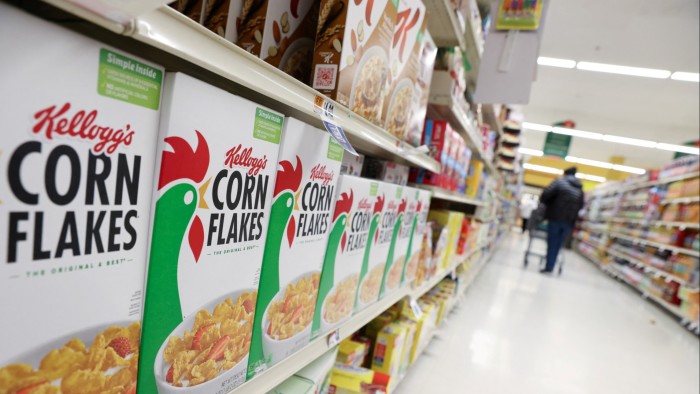Unlock the Editor’s Digest for free
Roula Khalaf, Editor of the FT, selects her favourite stories in this weekly newsletter.
Will and John Kellogg invented cornflakes to provide patients at the Battle Creek Sanitarium with a bland, easily digestible breakfast, which — they apparently believed — would dampen unseemly urges. Italian confectioner Ferrero, which has agreed to pay $3.1bn for WK Kellogg, appears to be making a contrarian bet that it can make cereal sexy.
Strategically, there are some good reasons for Ferrero to scoop up the cereal maker. The privately held purveyor of Nutella spread, Kinder eggs and Ferrero Rocher pralines — which last year reported sales of €18.4bn — likes the idea of bulking up in North America, a giant confectionery market in which it has already made a number of acquisitions. And while sweets are pricey and cyclical discretionary purchases, cereal is a sweet, inexpensive staple, gracing cupboards in 70 per cent of US households.
Trouble is, people are finding other ways to start their day. The volume of breakfast cereal consumed in North America is down around 17 per cent since 2019, say analysts at Jefferies, as consumers opt for avocado toast, overnight oats and breakfast-on-the-go. The underperformance of Kellogg’s brands — which include Corn Flakes and Rice Krispies — explains why the company was trading at a lowly enterprise value of 0.8 times forward sales before the bid was rumoured.
Ferrero is paying a big premium to acquire Kellogg, equivalent to around 30 per cent of the cereal-maker’s undisturbed market capitalisation. To justify that, it will need to grow Kellogg’s net profits, expected to be $102mn this year according to Visible Alpha. That looks challenging, especially because there’s not much obvious room to cut costs. While Ferrero already owns some US businesses including Butterfinger, Keebler and Crunch, these are biscuit and chocolate brands, so there may not be much overlap with cereal, beyond some back-office savings.
Still, a Kellogg’s turnaround is not impossible. For one thing, while sugary, stodgy cereal is on the wrong side of the breakfast zeitgeist, there is surely room for organic, gluten-free, high-protein alternatives. In the UK, niche brand Surreal has been doing well.
And for another, Ferrero has shown itself apt at delivering innovative riffs on its key products. The Nutella biscuit — a little like a custard cream with hazelnut spread inside it — has been a massive hit in Italy. Jazzing up Kellogg’s breakfast offering with lashings of chocolate might not have pleased Will and John Kellogg. But given the general soggy state of cereal consumption, it’s worth a try.
